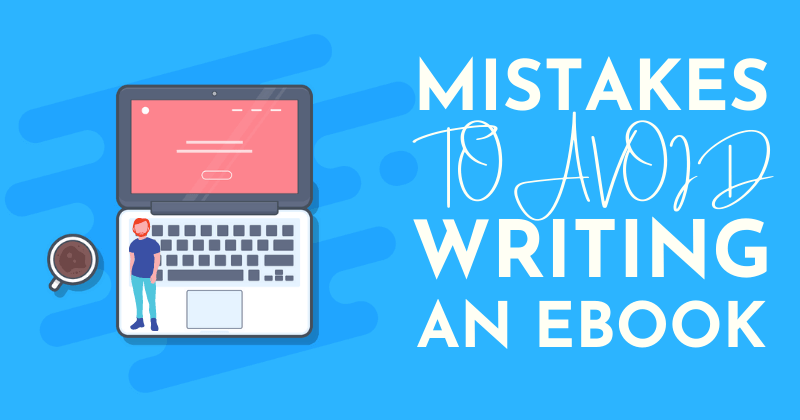16 Foolish Mistakes You Make When Writing an E-Book

This article may contain affiliate links. If you make a purchase using my links, I’ll earn a small commission at no extra cost to you. I appreciate your support!
Are you thinking of writing an e-book anytime soon?
Writing an e-book as a professional is not impossible anymore.
There are a lot of steps that go into creating the perfect e-book, right from planning to publishing the book.
I won’t spend time sharing with you how to write an e-book. I have written a 7000-word article on that, you should check it out – How to Write the Perfect E-Book.
In this guide, I shall be discussing some common e-book writing mistakes that you must avoid at all costs. I can save you some time, ready for these foolish e-book writing mistakes? Let’s Go!
Why Writing An E-Book Works
People who write an e-book generally fall into two categories:
- Lead Magnet by offering the e-book for free
- Those who want to earn money through their e-book
An e-book is an attractive lead magnet and can help visitors convert with ease. This way you get their email address and they get access to valuable information for free.
Here’s an example of a lead magnet for my e-book:
Alternatively, you could sell your e-book and make money, more sales equals to more money.
This guide should help you reduce your time and effort while writing your e-book. Enjoy!
16 E-Book Writing Mistakes to Avoid!
1. You Aren’t Sold on the Idea
This has happened to me many times and I don’t feel like the blog topic I’m working on is a great article.
Usually, I discard the article and search for a new topic to write on because If I’m not sold on the article, how can I expect my readers to like it?
If in the process of writing your e-book, you feel like this isn’t a great idea, don’t scrap it out immediately, think about why you feel this isn’t right and try making sense of it.
What to do Instead
Scrapping out a half-done article is much easier than a half-done book, so even though the right decision is to let go and start writing a new e-book on a new topic, if you’ve spent a lot of time and effort on the book, you should continue writing and editing till you hit publish.
Worst case scenario, no one likes your e-book. So what? the world didn’t end, you can write a new e-book on an excellent topic.
Only this time, you have an edge as you already know the steps and the process involved in writing an e-book.
So even in the worst-case scenario, you’ve learned a lot of valuable skills.
2. You Don’t Create a High Converting Landing Page

A landing page is a page on a website that is designed to convert visitors into buyers. Creating a landing page is an extremely important aspect of your e-book selling process.
Even if you plan to sell your e-book on Amazon or Kobo, you still need to have a landing page.
Here are 6 things every high-converting landing page needs:
1. A strong headline
2. A brief description of your book
3. A good image supporting your title and description
4. A clear Call-To-Action
5. (Optional) Testimonials, security badges, trust-building items, your face photo, etc
6. No other clickable link(other than the buy link) must be clearly visible on the landing page.
If you’ll be selling on third-party websites like Amazon E-book, create a button and name it, “Buy From Amazon” then link your Amazon e-book page to it.
I have three landing pages on my website, you can check them out! (P.S – They’re all FREE)
1. How to Save Money E-Book (Free)
2. Free Budget Template
3. Free 50-30-20 Budget Template Planner
3. You Act Like A Writer
The problem with most people who want to sell their e-books is that they think and act like a writer.
They don’t realize that their responsibilities cover rewriting, editing, formatting, publishing, marketing, creating banners and book covers, sales landing pages, etc.
They’ll give their best efforts to write the best e-book but they fail to do the rest.
What to do Instead
Plan and work on strategies other than writing.
While writing an interesting book is important, creating an attractive book cover or doing social media marketing is equally important, and editing is also important.
Want to learn how to be a bestselling author, and make a ton of money self-publishing books, I recommend checking out Nick Stephenson’s Your First 10K Readers Course! (Review)
4. Trying Too Hard To Be A Genius
Don’t we all try to be the most intelligent person in the room? I know I have! If you’ve never written articles or published an e-book, it’s natural for you to think that only if you’re smart, people will read your stuff.
But that’s a half-truth, we do need to be good at something but we need not be experts.
What to do Instead
We need to be good enough to provide some value to the reader. If Jason and I write different books on How To Gain Confidence and we both include the point, “Practicing in front of the mirror is the best confidence booster”, the only way people can prefer one book over another is by figuring out which book portrayed the story in a better, more interesting and relatable way.
5. Writing A Very Huge Introduction
I like introductions, everyone loves a good introduction. We learn a few things about the author, his life, how he became successful in his field how it impacted his life, etc.
As a writer, you might feel that people (readers) would love to listen to your introduction and the fact is that they do love a good introduction but that’s not why they purchased the e-book right?
They’re here for the content after the introduction!
They want to know about your secret, basically what you’re offering in the title and description of the e-book.
If your e-book is about Men’s fashion, they expect to improve their fashion game by a huge percentage. They would like to listen to your story but moreover, they want to know your tips and tricks.
What to do Instead
An introduction is important so don’t ignore it. A few pages are good but don’t overdo it!
Use real-life examples while giving pointers. Remember that readers are here to seek what you have to offer (this must be clearly stated in your e-book title and description).
6. Rushing To Finish The E-Book
You’ll find numerous articles teaching you to write an e-book in a day or two. They want you to believe that writing a book is easy and fast.
While it is easy, don’t be under the assumption that you can write a book fast while maintaining the quality of the e-book.
What to do Instead
I suggest you take it slow, and write for an hour a day. Don’t rush the process, remember you don’t have to get burned out. Most successful authors write for months and years before they publish their books.
7. Not Creating Backup Files After Each Draft
Not creating downloadable backup files can be your worst nightmare.
Even if you’re using Google Docs (which saves data immediately without you manually clicking save) you need to download backup files after every draft.
That way you always have the original doc file.
In case you feel like checking out the previous draft, maybe to take inspiration or understand what you wrote earlier, a backup draft can be really helpful. If you’re on Google Docs, you can export your doc file in multiple formats.
What to do Instead
Take backup copies each time you finish a draft or each time you make a significant change in your write-up.
Create a folder on the drive and store all your drafts in the order of date of export. This will make your life easier.
What I like to do is copy those drafts to another laptop and my USB just to make sure it doesn’t get deleted, unnecessary but I do it anyway:)
8. Focusing on Grammatical Mistakes While Writing
Are you trying to manage two tasks at once i.e. editing and writing at the same time?
Writing and editing at once can drastically reduce your thinking speed thus making you super slow while typing those words.
When you’re writing, don’t spend time correcting grammatical mistakes or sentences. Simply type and type till you finish typing.
Tweaking your written matter is great but doing so can reduce your speed and waste time. It also breaks the writing flow and you end up forgetting what you were supposed to write
What to do Instead
When you’re writing, focus on writing. Once you write everything, then start editing. If you have the Grammarly extension enabled while you’re writing, disable it and enable it only once you start editing.
Grammarly is a browser extension that finds grammatical errors and helps you rectify them. This saves you a lot of time, a highly recommended extension!
9. Designing The Book Cover By Yourself
Do not judge a book by the cover is not true in the case of an online e-book. In the online world, a great e-book has to have a great eye-catching book cover.
Now unless you’re a graphic designer or you know how to use Canva to make really attractive stuff, I suggest you outsource this to someone with the right expertise.
The first thing people notice in a book is its title, the second is the book cover so you can’t afford to create a mediocre book cover and expect it to make you rich.
If you’re a celebrity or a well-known entrepreneur, you could get away with a mediocre cover but 98% of the time, that’s not the case.
What to do Instead
If you don’t have the money to pay for a professional designer, use Canva to create your e-book cover.
Canva has an easy user interface and it’s very customizable, they also have hundreds of premade templates you could take some ideas from.
Keep it simple, slightly professional (optional), with two or three primary colors. If you have money, don’t hesitate to hire a designer.
10. Not Hiring A Good Proofreader
Proofreading is the last thing to do before publishing your e-book.
Once you’ve written down everything, made changes multiple times, used Grammarly and a few other English checker software, and formatted it, someone needs to take a proper read to catch any typing errors you may have ignored.
While you can proofread it yourself, you are so familiar with your content and its structure, that you’re likely susceptible to errors.
What to do Instead
If you want to DIY, try changing the color and font style of your book and then start proofreading. Also changing the location may improve your chances of catching errors.
Try these two tricks and I’m sure you’ll be reading those pages with full attention even if you’re familiar with the contents. Have money, hire someone to do it for you.
Want to learn how to be a professional proofreader?
Check out this comprehensive course by Knowadays!
Knowadays (Previously known as Proofreading Academy) is one of the best online proofreading courses I’ve come across. The syllabus, pricing, and support team make learning proofreading very easy.
I’ve written a detailed review on Knowadays, if you’re interested in pursuing proofreading as a full-time career, read the article.
If you want to know my top recommendations for proofreading courses, here you go!
🏆 Best Proofreading Courses (2024) 🏆
| BEST OVERALL | RATINGS |
|---|---|
| 1. Knowadays (review) | 4.8 |
| 2. Proofread Anywhere (review) | 4.7 |
🏆 Best Proofreading Courses (2024) 🏆
| BEST OVERALL | RATINGS |
|---|---|
| 1. Knowadays (review) | 4.8 |
| 2. Proofread Anywhere (review) | 4.7 |
11. Being A Perfectionist
Perfection is the enemy of success, if you haven’t read this quote before, now you have. Trying to be perfect is great but when we don’t stop till we think our work is perfect, it is foolish.
Nothing can ever be perfect, think about that for a minute. No matter how much you try to write an e-book that every single person on earth will beg to read, your wish won’t be granted.
Because each person is different and the definition of a perfect e-book may differ from person to person.
I like books on personal finance whereas a few of my friends hate finance books. If you spend 15 minutes trying to decide if a particular word needs to be replaced with its synonym, You’re Wasting Time!!!
What to do Instead
Give yourself a deadline, you must finish editing in that time frame. As long as you’re not making grammatical mistakes and typo errors, you can spend less time editing while ignoring the beautification of words and so on.
Don’t try creating a book with the intention of it being perfect, you’ll never hit publish with that mentality.
12. Following The Money Trail
Topics like meditation, business success, and personal development are booming. So any new author will feel the need to write an e-book on such highly searched topics so he can make more money.
While you can certainly do that, keep in mind that the more popular the topic is, the more it’s difficult to make money from it because the number of people trying to make money from it increases.
If you look at these book topics closely, you’ll find out that most of the time, the best-selling books are of the big guys in the book industry.
For example, in personal finance, you’ll see that Robert Kiyosaki always gets picked first, and then there are 20 other books all of which are written by the big guys. If you’re a newbie, the chances of you making any income in such competitive spaces are slim.
What to do Instead
Choose a topic that isn’t too famous. The topic you choose should be something you know a lot about so you won’t get bored or exhausted when you sit to write.
You could do keyword research to find niche ideas in a broad category. For example, I want to write a book on personal finance but it’s hard so I’ll niche down to budgeting
13. Not Doing Enough Research

People pay for knowledge, people pay for something that can add value to their lives. If you write a mediocre e-book, you’re not going to sell any books.
If you want to be a best-seller, you have to spend time researching your topic.
Even if you think you know everything, you still need to spend time researching, gathering information, and making sense of all the information.
What to do Instead
Most writers spend equal time reading blog posts and other books before they write their own. It would help if you did that too.
When you read through the books, take a good look at how they structure their books, their table of contents, and most importantly what they write in their introduction and conclusion chapters. Include statistics, case studies, and life examples.
13. You Over Complicate Simple Things
If I want to tell you that eating a burger with two hands is the most scientific way to eat, should I state it directly or should I use scientific words and get you confused for 5 full minutes just because I want to sound knowledgeable in the field of eating burgers?
Similarly, a common trend seen among book writers is that they overcomplicate simple things. If you’re having a spending problem, that’s because you have no self-control over your money.
It’s your mentality and thought process that you must. Now I could explain it like that or I could start describing the spending journey of the consumer to you and get you sleepy.
Most readers read with enthusiasm but lose focus when they read multiple pages and get nothing out of it.
What to do Instead
You’re probably talking about one concept for many pages because you want to tell a story and conclude with a moral.
Nothing wrong with that but why don’t you start with the point as your heading, then talk about your story and conclude, keeping it brief?
That way readers get the idea and you can convey your story. For example, your heading – Burgers are extremely Unhealthy, opt for a homemade burger (recipe included!).
This is followed by your story where you explain why you consider burgers unhealthy and conclude with your recipe. Simple!
14. Writing Like A Robot
I’m going to say it again, people like to know the real YOU, when you write an e-book, they want to know what you have to teach but they also want to feel good and enjoy it to some extent.
By writing like a robot, you’re sending messages to the reader that you have no emotion and you only work by logic.
Most human decisions require both logic and emotions. If you feel people are here to only absorb knowledge, you’re wrong.
They do want to feel smarter but they want to feel excited, happy, puzzled, confused, etc. By writing like a robot you’re not fulfilling any of these things thus you end up with a boring e-book that nobody wants to read.
What to do Instead
Try to add personal experiences, your honest thoughts, and feelings about a topic. Try understanding whom you’re writing the book for;
For example, if you’re writing about “healthy food for people with high cholesterol”, you need to understand what problems they face and how they live their life. This helps you make your e-book more relatable to your specific audience.
15. Stressing More On Aesthetics And Less On Writing

Aesthetics are very important. Without an eye-catching book cover or some clean graphics inside the book, the chances of your e-book selling fall but that doesn’t mean you should focus less on writing.
What is your e-book about? Is it a mix of beautiful graphics or is it a book where you write more and include fewer pictures?
If you think you’ll sell a bunch of books solely based on your aesthetics, focus on graphics and design but if written content is vital, don’t spend more time on designing than writing.
What to do Instead
Don’t think about aesthetics till you write and edit your content. Only once you are satisfied with what you’ve written, you should start worrying about a sleek design that people will be mesmerized with. Content is always superior to good looks.
16. Thinking Your Knowledge Is Not Unique Enough
Haven’t you heard every author say that Your content should be Unique? It should stand out from the competition. This blinds people into believing that their content isn’t unique enough for people to like their e-book.
Your content does need to be unique but as long as you’re writing your original story, key points that you’ve encountered in your life, your life learning, etc. You don’t need to worry about your e-book being unique.
What to do Instead
Uniqueness comes from original content that creates an impact on the reader’s life.
As long as you don’t steal content from your competitors and focus on talking about your learnings in the book, I seriously don’t think you need to worry about creating a unique piece of content.
Don’t think of fake stories and examples to make your content stand out. State facts and original relatable content that you have truly experienced.
This original content then connects with the reader’s thought process and voila your content is unique and amazing.
The Perfect E-Book: My Thoughts
The beauty of creating an e-book is that you don’t need to get super stressed if you make mistakes. You can always rectify them immediately.
The smartest way to figure out if your book solves the reader’s problem is by getting feedback on your book.
You may think it’s amazing, interesting, and highly valuable, but that may not be the case with your readers.
The sole purpose of your e-book must be to provide value to your readers. They like your e-book, they like you, they recommend it to their friends, and they have faith in you.
Don’t push hard to sell your e-book, instead even after you publish it, read the reviews, and ask your readers why they didn’t agree with your thoughts and how you could have made it better. Then make those changes if it makes sense to you.
Want to write and publish your e-book, here is an article – How to Write the Perfect E-Book.
Have you enjoyed this post? If so, you might want to subscribe to my newsletter. It usually contains life lessons and money-related topics, some interesting observations, links to articles or books I’ve read, and tips to be a better person. If you’re interested in these things then subscribing will be simply wonderful 🙂 PS: Subscribe and Get your Freebie below!
Also, I’m a YouTuber now! If you’re interested in Pinterest Marketing, Blogging, or business-related things, Subscribe to my Channel and I’ll see you in the comments!